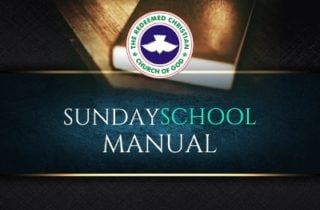
RCCG Sunday School Students Manual 10th December 2017 Lesson 15 — The Fruit Of The Spirit: Joy And Peace
Click HERE for Previous RCCG Sunday School Manual
TOPIC — THE FRUIT OF THE SPIRIT: JOY AND PEACE [SUNDAY, 10TH DECEMBER 2017]
MEMORY VERSE: “For the kingdom of God is not meat and drink; but righteousness, and peace, and joy in the Holy Ghost.” – Romans 14:17
BIBLE PASSAGE: James 3:13-18
INTRODUCTION:
Literally, the “fruit of the Spirit” is what happens when the Holy Spirit indwells a believer. The “fruit” is the product of the Holy Spirit’s cultivation of character in a heart. Galatians 5:22-23 describes what that fruit looks like; the second and third characteristics listed are joy and peace respectively. We are to submit our wills to God’s leading and our actions to God’s word, but the actual results are up to Him. Only God can give true joy and create peace through the work of the Holy Spirit.
LESSON OUTLINES:
1. JOY
2. PEACE
JOY
The Greek word for joy is chara. Joy is the natural reaction to the work of God, whether promised or fulfilled. Joy expresses God’s kingdom – His influence on earth (Romans 14:17). The Greek chara is closely related to charis, which means “grace” or “gift”. Chara is the normal response to charis – we have joy because of God’s grace. Possessing joy is a choice. We choose whether to value God’s presence, promises and work in our lives. When we yield to the Spirit, He opens our eyes to God’s grace around us and fills us with joy (Romans 15:13). The Spirit’s production of joy can manifest in several different ways:
1. The joy of deliverance: When God sets someone free, rejoicing is in order (1Samuel 2:1; Acts 12:14).
2. The joy of salvation: Our greatest reason to be joyful is that God wants to save us and spend eternity with us (Luke 15:7; Acts 8:8; 15:3).
3. The joy of spiritual maturity: As the Holy Spirit works in us to bear more fruit, we become confident in God’s promises and rejoice in our walk with Him and with other believers (2Corinthians 1:24; 1Thessalonians 2:19-20).
4. The joy of God’s presence: The Holy Spirit draws us to God, in whose presence we can know true joy. Without the Holy Spirit, no one would seek God (Psalm 16:11; Matthew 2:10).
PEACE
At birth, our sinful nature has already declared war on God and His truth. However, God’s methods of warfare are not what we expected. Instead of a battle, He sent us the Prince of Peace (Isaiah 9:6). Jesus’ goal in coming to earth was more than simply to cease hostilities; He came to bring about a full and abiding relationship of restoration and love. The cost of this peace was His life (Isaiah 53:5). Hence, the fruit of the Spirit includes a peace that goes beyond that of salvation. It is a sweet relationship. We are called to His presence (Ephesians 2:11-18) and called to be confident in that presence (Hebrews 4:16) because we are His friends (John 15:15). God’s peace transcends earthly matters and it is void of anxiety (Philippians 4:4-7). The Spirit-filled Christian has a peace that is abundant, available in every situation, and unlike anything that the world has to offer (John 14:27). The alternative to being filled with the Spirit and His peace is to be filled with alarm, doubt, fear and dread.
CONCLUSION:
As believers, we must allow God to work in our hearts and in our relationships by laying down our own schedule and trust in God. Through the help of the Holy Spirit we can experience and manifest true joy and peace.
QUESTIONS:
1. The spirit’s production of joy can manifest in several different ways. Mention them?
2. Describe true peace.



